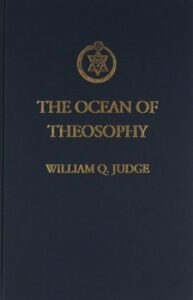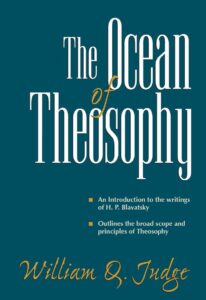Studies In The Ocean of Theosophy Part XXIV
Theosophy Magazine
Vol. 22, No. 12 October 1934
pages 553 - 556
Part XXIV
MAN’S history portrays incessant struggle: struggle to be born, struggle to remain in physical existence, struggle to die. Nor is this terminated by death, but continues in Kama Loka, where the being “again struggles and loosens himself from the lower skandhas, that detain him in that state.” From then on, struggle is transcended until “the immortal who travels from life to life” undertakes rebirth, newly masked and newly named, “in the world of mortals.”
This interim of peace is known as Devachan, “the place of the gods,” “where the soul enjoys felicity” in a subjective extension of the personal life, a sublimation of its highest ideals. Man never stops thinking, but while on this mundane plane can only “to a fractional extent act out the thoughts” or exhaust the psychic energies “engendered by each day’s aspirations and dreams.” This energy is not lost, but is stored and held latent until death, when it bursts “from the weakened bonds and plunges Manas, the thinker, into the expansion, use, and development of the thought-force set up in life.”
Paradoxical as it may seem, Devachan “is one of the necessities of evolution growing out of the nature of mind and soul,” yet is due to “man’s ignorance of his own powers and faculties.” Earth is not the Ego’s home and, although periodically drawn to it by the “thirst for life expressed by the word Tanha” — “the pulling or magnetic force lodged in the skandhas inherent in all beings”; the friction between the eternal, spiritual Identity and the false selfhood assumed, temporarily, during the incarnation, is so intense that “if the average man returned at once to another body in the same civilization he had just quitted, his soul would be completely tired out and deprived of the needed opportunity for the development of the higher parts of his nature.” Human delusion so hampers and obstructs that the “very nature of Manas requires a devachanic state as soon as the body is lost, and it is simply the effect of loosening the bonds placed upon the mind by its physical and astral encasement.” Hence “the whole process is remedial, restful, and beneficial,” until the lower mind shall have been brought under control.
Devachan is the realm of the King Faculty, imagination. Manas has now “simply gotten the opportunity to make its own world.” Released from “the clogs of physical life,” it fabricates wondrous joys and fair beauties from the possibilities fleetingly glimpsed in events of the incarnation just passed. Regardless of its character, this self-made world fully satisfies. The colorless Devachan resulting from a colorless personal span is as superlatively blissful to its author as the one “rich in variety and effect” can possibly be to him reflecting it from his own rich, eventful incarnation.
“The last series of powerful and deeply imprinted thoughts are those which give color and trend to the whole life in devachan.” Those form the pattern on which “a whole set of events and experiences” are woven and expanded “to their highest limit.” And in this process “the entity has its youth and growth and growing old; that is, the uprush of the force, its expansion, and its dying down to final exhaustion.” There, everything “is as real to the being as this world seems to be to us.” Hence, it “is not in any sense monotonous,” nor “a dream save in a conventional sense.” Rather is it a state of abstraction comparable “to that of the poet or artist who, rapt in ecstasy of composition or arrangement of color, cares not for and knows not of either time or objects of the world.” Expressive of the nature’s best, Devachan might be regarded as of the bliss aspect of Buddhi, without buddhic wisdom. Submergence of the consciousness in the state renders it illusionary; but the illusion is divine.
The length of this “interlude between births in the world is exactly proportioned to the psychic impulses generated during life.” The more exalted the sentiments, the longer it will take to unfold their potencies; while the more affinity there is for worldly affairs, the sooner the pull of Tanha will prevail. But there are no clocks in Devachan. “No time is there.” “The soul has all the benefit of what goes on within itself in that state, but it indulges in no speculations as to the lapse of moments.” To the devachanee, “all is made up of events.” Yet, as the heavenly vision drifts before his mind’s eye “the solar orb is marking off the years for us on the earth plane,” until we, too, shall sink to rest; and, therefore, there must be some relation between time in respect to the planet Earth and the rate at which the psychic forces of her inhabitants expand in this after-death state. But, “this being a matter which deals with the mathematics of the soul, no one but a Master can tell what the time would be for the average man of this century in every land.” This average time They state to be approximately fifteen hundred years.
Like all other subjects, Devachan is included in the great doctrine of Karma. “The law of karma which forces us all to enter the world, being ceaseless in its operation and also universal in scope, acts also on the being in devachan, for only by the force or operation of Karma are we taken out of devachan.” “The ‘dream of devachan’ lasts until karma is satisfied in that direction,” that is, until “the being’s own life-thoughts and aspirations,” having spent their force, can no longer counteract the force of Tanha. Of those returning quickly to rebirth, one class comes through the karmic merit of wisdom; another by karmic merit entitling help to return; still another class by the karmic de-merit of materialism.
This entire matter is an interesting study in the play of forces — mighty powers resident in Man himself. The force of Kama draws him into Kama Loka and holds him there; Kama expended, the force of idealistic thinking carries the mind into Devachanic meditation; this higher power’s action exhausted, Tanha draws the thinker back to run a new personal cycle. All of these represent erroneous employment of individual potencies, because of false self-identification on this plane of causation. As things now stand in general, Man, the Creator, the God, is swept helplessly along, from state to state, like a leaf, on the swelling tides of his own ignorantly directed forces: pulled into birth, pushed into Kama Loka, plunged into Devachan. Whereas each being might consciously direct his course by will-action, in harmony with the evolutionary urge focussed in all things, and no longer be delayed by the counteracting force of personal desires. No matter how pure and high such desires may be, in themselves, involvement in them spells delay in Self-realization; for Soul-growth comes not by the glorified selfishness of Devachan, but by wise action on Earth, for the common weal.
In this connection, it is noteworthy how much more powerful seems good than evil. The state of Devachan is much longer than Kama Loka, excepting for the grossly wicked. The comparatively little idealistic thought of our short earthly span creates a Heaven lasting hundreds of years. These facts bring courage in the speculation that were humanity to turn definitely right, it could quickly wipe out its heavy load of Karmic disabilities. It is valuable in this connection to bear in mind the statement of The Secret Doctrine (I, 644): “A given amount of energy expended on the spiritual or astral plane is productive of far greater results than the same amount expended on the physical objective plane of existence.”
Obviously, mental involvement and uncontrolled feelings, high or low, are in inverse ratio with the establishment of true self-identification; hence the latter must shorten the states after death, in accordance with its degree of attainment. This emphasizes to the student the value of the ancient Upanishad method of “shaving” away identification with body, circumstances, mind, or any other attachment, in order to assume and maintain the position of Perceiver. To stand as Perceiver of all states is to lessen involvement in any, whether waking, dreaming, or after-death state. More time in service and less in rest shortens the life-cycles. The more units who undertake this sacrifice, the more will the racial cycles be accelerated and evolution quickened.
Even though success in such effort seems negligible to the individual the effort counts in Karmic stamina, bringing possible help from the Elder Brothers to reincarnate more quickly, to help on Their Cause. For thus is it stated: “They deal with certain entities in devachan for the purpose of getting them out of the state so as to return to earth for the benefit of the race. The Egos they thus deal with are those whose nature is great and deep but who are not wise enough to be able to overcome the natural illusions of devachan.”
Yet this state is “neither meaningless nor useless. ‘In it we are rested; that part of us which could not bloom under the chilling skies of earth-life bursts forth into flower and goes back with us to earth-life stronger and more a part of our nature than before.'” If we be not strong enough or worthy enough yet to be awakened, why “‘should we repine that Nature kindly aids us in the interminable struggle, why keep the mind revolving about the present petty personality and its good and evil fortunes?'” Unwillingness to take our necessary due of Devachan would be as personal as selfish longing for its joys. And again, is it not possible for a spark of ambition to smolder, unnoted, in the eagerness for immediate reincarnation? Before the devoted and disaffected lies the middle-path of effort — to learn, to labor, and to wait, that all may best benefit.
Resignation to the Good Law and trust in its Great Servants must at length bring realization that all changes from state to state are but re-births. Even thoughts, Mr. Judge states elsewhere, have their life-cycle, death, and devachan, then re-birth. Therefore, whatever the condition, he who is in harmony with it is attuned to the heart of Nature and progresses in her cycles of eternal progress.
Back to The Ocean of Theosophy



